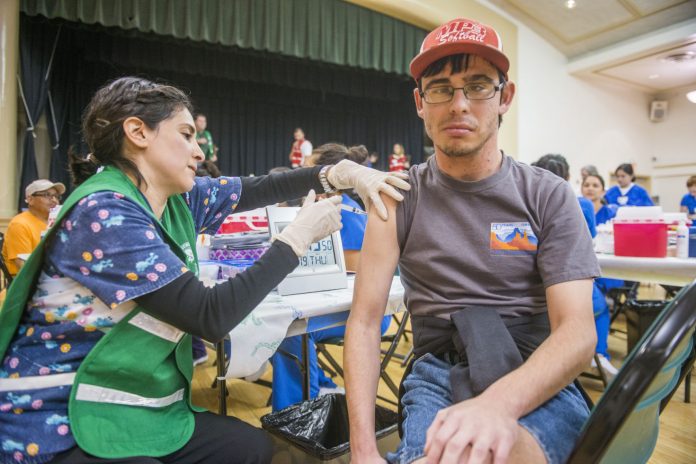
Schools in San Benito County—and across California—have been struggling to implement a new state law requiring campuses to stock prescribed epinephrine auto injectors, as many physicians aren’t willing to write blank orders for the products.
A new law, signed by Gov. Jerry Brown in mid-July, adjusts state education code to limit the liability of doctors writing prescriptions for epinephrine auto injectors. Anita Sarringhaus, a nurse with the Hollister School District—which had auto injectors at schools two years before they were required—is hoping the revised code will allow San Benito High School and the county’s early childhood education center to join them in becoming compliant.
The original bill, which took effect Jan. 1, required public schools to provide epinephrine auto injectors to school nurses or trained personnel who volunteered to administer them when they identify students suffering from serious allergic reactions.
San Benito High School’s Superintendent John Perales called the original law “great” but also rushed, in an interview with the Free Lance in late October.
“I think the law was rushed through, without giving it a lot of thought for how it was going to be implemented,” Perales said.
As of last month, the high school had students carrying their own epinephrine auto injectors but the district did not have one, Perales said. Trustees approved hiring a full-time nurse, instead of contracted ones, in late October. In the future, students will carry their epinephrine auto injectors, and the district will have a second prescription for them in the office along with a nurse who can help them dispense it.
In contrast, the Hollister School District, one of the feeder districts for the high school, had epinephrine auto injectors for several years before laws required it.
At the California School Nurses Organization’s Bay Coast Conference in October, about 20 nurses in a room of about 100 of the professionals raised their hands to say they had successfully implemented the new law that took effect in January, Sarringhaus said.
Nurses in that district had first asked for funds for epinephrine auto injectors in 2008 after coming back from a state conference that included a training on anaphylaxis at the end of 2007, Sarringhaus said. They got the money but it took five years to find a doctor willing to prescribe the product.
Since then, the EpiPens4Schools program started. Through the program, Mylan Specialty, the marketer and distributor of EpiPens, provides two adult and two junior EpiPens to qualifying campuses free of cost.
The epinephrine auto injectors typically cost $100-200 each, depending on the person’s insurance, “and they only last one year,” Sarringhaus said.
The nurse knows first hand that having the auto injectors matters. Last school year, a kindergarten student at Ladd Lane got stung by a bee on her ankle and went to see the health clerk with her grandma during the school’s Olympic Day.
Health clerk Connie Werolin checked the student and had her wait in the office for 15 minutes, something clerks do if there is a chance a child might have an allergic reaction.
“After 15 minutes, she had nothing,” Sarringhaus said. “Nothing showed.”
So Werolin told the girl to come back if anything felt different. At lunch she told her grandma that she didn’t feel right and asked to go back to the health clerk.
The health clerk re-assessed the bee sting and it looked fine. So did the little girl. So she called Sarringhaus and explained the student was not in obvious distress but that she was complaining of a sore throat and saying something wasn’t right.
The student had something nurses call a “sense of doom” and Sarringhaus pulled out a stethoscope and heard wheezing and something called strider. It was early signs of anaphylaxis. Sarringhaus asked the grandma if she could administer an epinephrine auto injector.
“Within 60 seconds, she just took this big, deep breath and said ‘I feel so much better,’ ” Sarringhaus said. “And she looked better.”
By the time the paramedics arrived the previously quiet little girl was back to her usual talkative self and was able to tell them exactly what happened, Sarringhaus said. She said, “Oh, I couldn’t breath,” the district nurse recalled.
The student left the hospital with an EpiPen of her own, Sarringhaus said.









